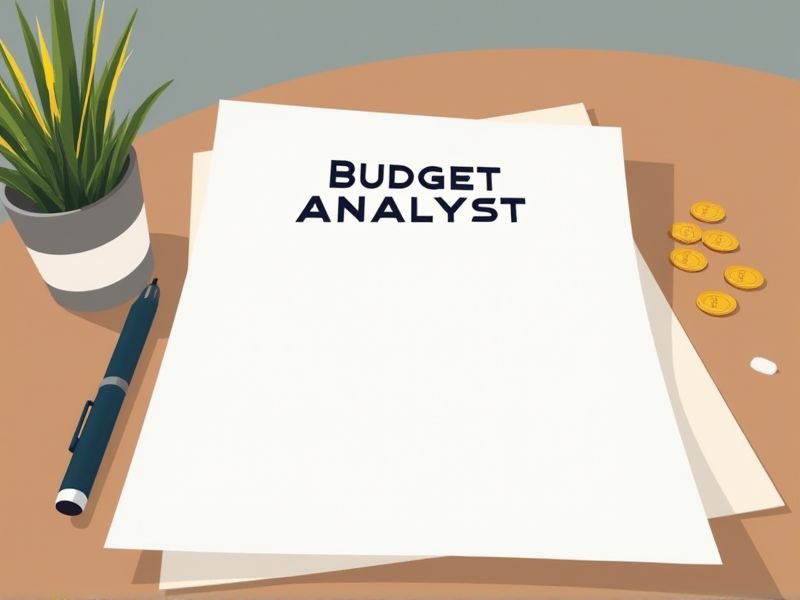
Budget analysts play a pivotal role in financial planning and decision-making, requiring accurate data interpretation and strategic thinking. Certain certifications enhance their skills, providing credibility and a competitive edge in financial analysis. Certifications also reflect a commitment to maintaining current industry standards and practices. Important certifications for a budget analyst often include Certified Government Financial Manager (CGFM) and Certified Management Accountant (CMA).
Certified Government Financial Manager (CGFM)
Being a Certified Government Financial Manager (CGFM) equips budget analysts with a thorough understanding of governmental financial processes and standards, directly enhancing their ability to manage public funds efficiently. The certification ensures that analysts are well-versed in the principles of accountability and transparency, crucial for building public trust. With the CGFM, budget analysts are better prepared to interpret complex financial data, leading to more accurate budget forecasts and analyses. This credential also demonstrates a commitment to professional ethics and continuous learning, vital in navigating the evolving fiscal landscape.
Certified Public Accountant (CPA)
A CPA provides a strong foundation in accounting principles, which enhances the analytical skills required for accurate budget forecasting and financial planning. Their expertise in auditing ensures budgets are compliant with financial regulations, reducing the risk of legal issues. CPAs possess advanced tax knowledge, aiding budget analysts in optimizing tax-related budget components efficiently. Their proficiency in financial reporting contributes to transparent and precise budget presentations, facilitating informed decision-making.
Certified Management Accountant (CMA)
A Certified Management Accountant (CMA) enhances a Budget Analyst's ability to provide insightful financial analysis, as it offers advanced expertise in cost management and strategic planning. The CMA certification equips analysts with a robust understanding of financial data interpretation, crucial for informed budgeting decisions. This credential ensures adherence to industry standards, bolstering an organization's financial transparency and accountability. Employers may prefer candidates with a CMA, as it signals commitment to continuous professional development and competence in management accounting.
Certified Internal Auditor (CIA)
Certified Internal Auditors possess a deep understanding of risk management and control, helping budget analysts ensure financial accuracy and compliance. Their expertise in internal auditing enhances an organization's ability to detect inefficiencies and improve budgeting processes. CIAs provide valuable insights into financial data interpretation, which assists budget analysts in making informed decisions. Strong internal controls, enforced by CIAs, reduce the likelihood of financial discrepancies and strengthen budget integrity.
Certified Government Auditing Professional (CGAP)
A Certified Government Auditing Professional (CGAP) credential equips budget analysts with specialized knowledge in public sector auditing, ensuring compliance with governmental accounting standards. This expertise enhances their ability to identify discrepancies and inefficiencies in budgetary allocations, leading to more effective use of public funds. Possessing CGAP certification often bolsters credibility and trust among stakeholders, increasing the likelihood of successful budget implementation. The understanding of audit processes inherent in the CGAP certification also supports budget analysts in proposing informed financial strategies and risk management solutions.
Certified Fraud Examiner (CFE)
Employing a Certified Fraud Examiner (CFE) in a budget analyst role minimizes financial discrepancies, as the CFE's expertise in fraud detection directly strengthens financial oversight. The presence of a CFE ensures comprehensive analysis of financial data, which reduces the likelihood of fraudulent activities impacting budgetary allocations. As budget analysts handle significant financial data, a CFE's skills in investigative accounting help identify irregularities early. Integrating a CFE's insights into budgeting processes enhances overall trust in financial management practices.
Chartered Financial Analyst (CFA)
Possessing a Chartered Financial Analyst (CFA) credential equips a budget analyst with in-depth financial analysis and investment management skills. Due to the rigorous training involved, CFAs bring a level of credibility and expertise that enhances the precision in evaluating and forecasting budget projections. Complex financial environments require budget analysts to interpret economic trends and integrate them in budgetary planning, a skill honed through the CFA program. Employers often prefer CFAs for budget analyst roles since they signify a commitment to ethical standards and a global benchmark of financial expertise.
Project Management Professional (PMP)
A Project Management Professional (PMP) certification enhances a budget analyst's ability to efficiently allocate resources, ensuring projects remain within financial constraints. With PMP knowledge, a budget analyst gains a comprehensive understanding of risk management, which mitigates financial uncertainties. PMP training equips budget analysts with advanced communication skills, facilitating better stakeholder interactions and financial reporting. Certified budget analysts can integrate proven project management methodologies, improving cost estimation accuracy and financial forecasting.
Financial Risk Manager (FRM)
Financial Risk Managers provide expertise in identifying, assessing, and prioritizing potential financial risks, which helps Budget Analysts make informed decisions. By understanding risk exposure, budget analysts can better allocate resources to mitigate potential financial losses. FRMs offer insights on market trends and risk management strategies essential for accurate budget forecasting. Their risk evaluation skills improve the precision of financial planning, ensuring that budgets are both effective and resilient under varying conditions.
Certified Analytics Professional (CAP)
Obtaining the Certified Analytics Professional (CAP) credential enhances a budget analyst's ability to interpret and analyze complex financial data, leading to more accurate budget forecasts. Mastery of analytics optimizes resource allocation, facilitating efficient decision-making processes within the organization. The CAP credential elevates a budget analyst's credibility, fostering trust and confidence among stakeholders who rely on precise financial insights. It supports career advancement by signaling expertise and commitment to ongoing professional development in analytics to employers.
Summary
You can expect enhanced career opportunities by obtaining certifications as a Budget Analyst. Companies often see certified professionals as more skilled, leading to potential salary increases. Professional development and knowledge expansion allow you to make more informed financial decisions. Your comprehensive skill set may result in improved efficiency and accuracy in budget management.
